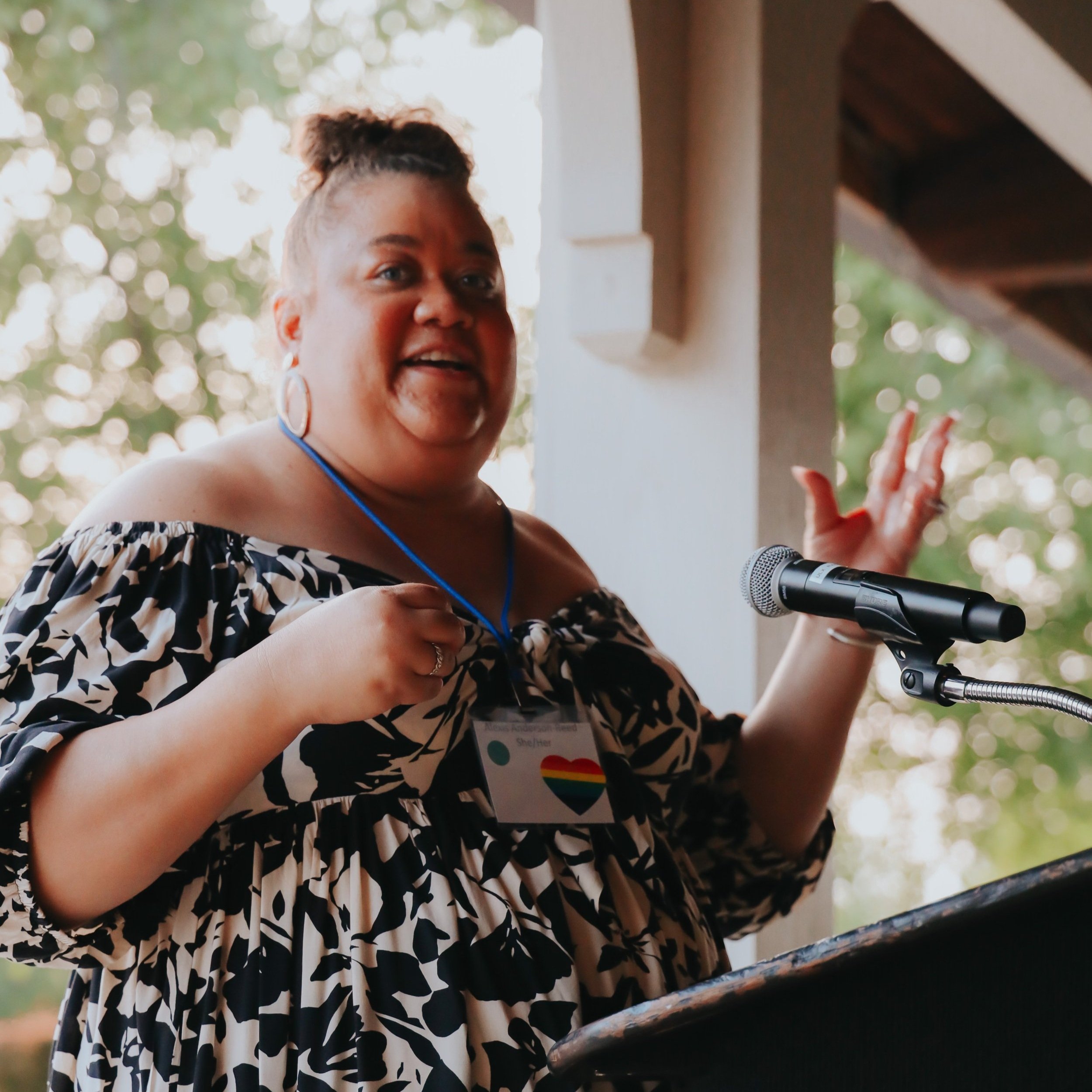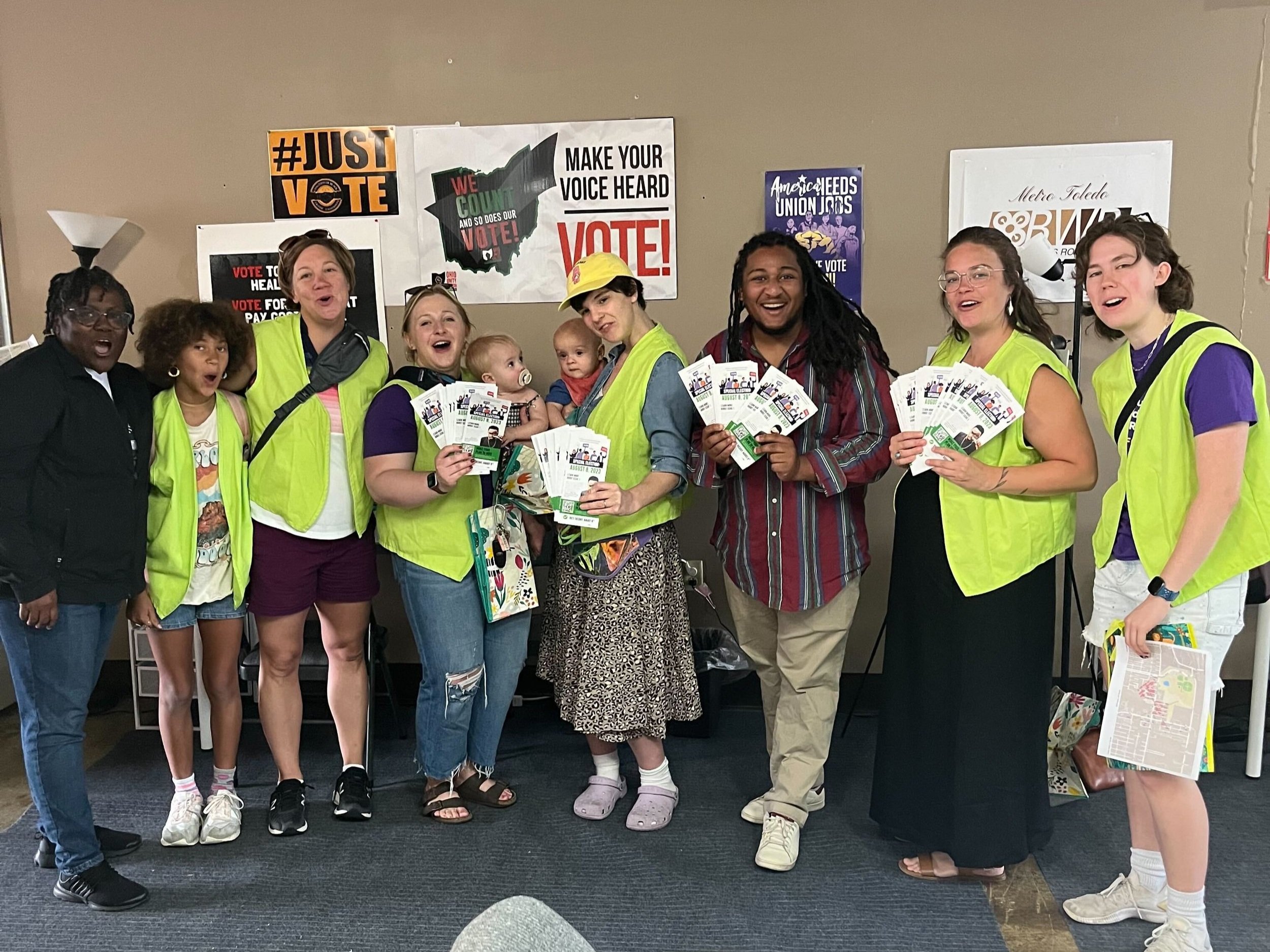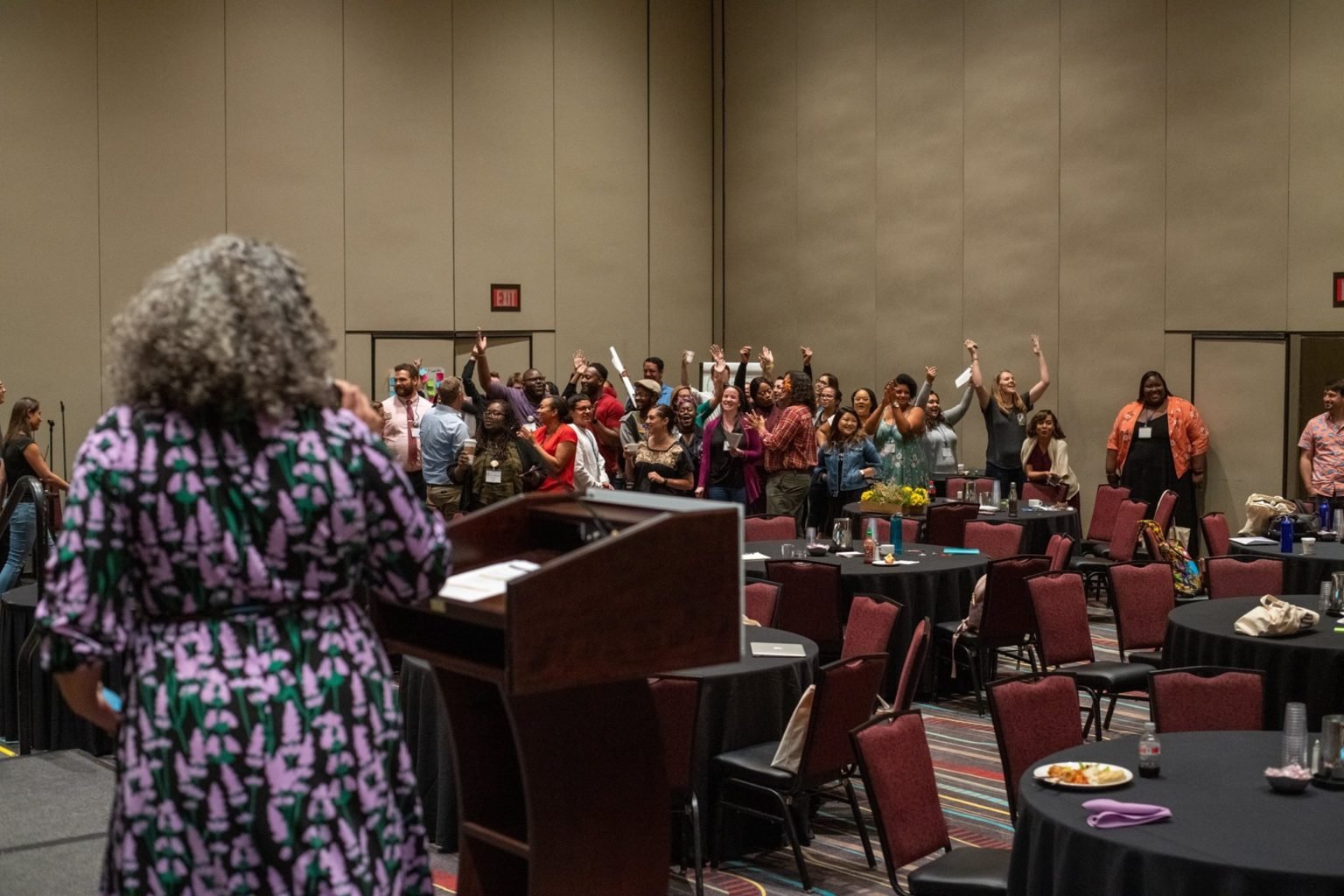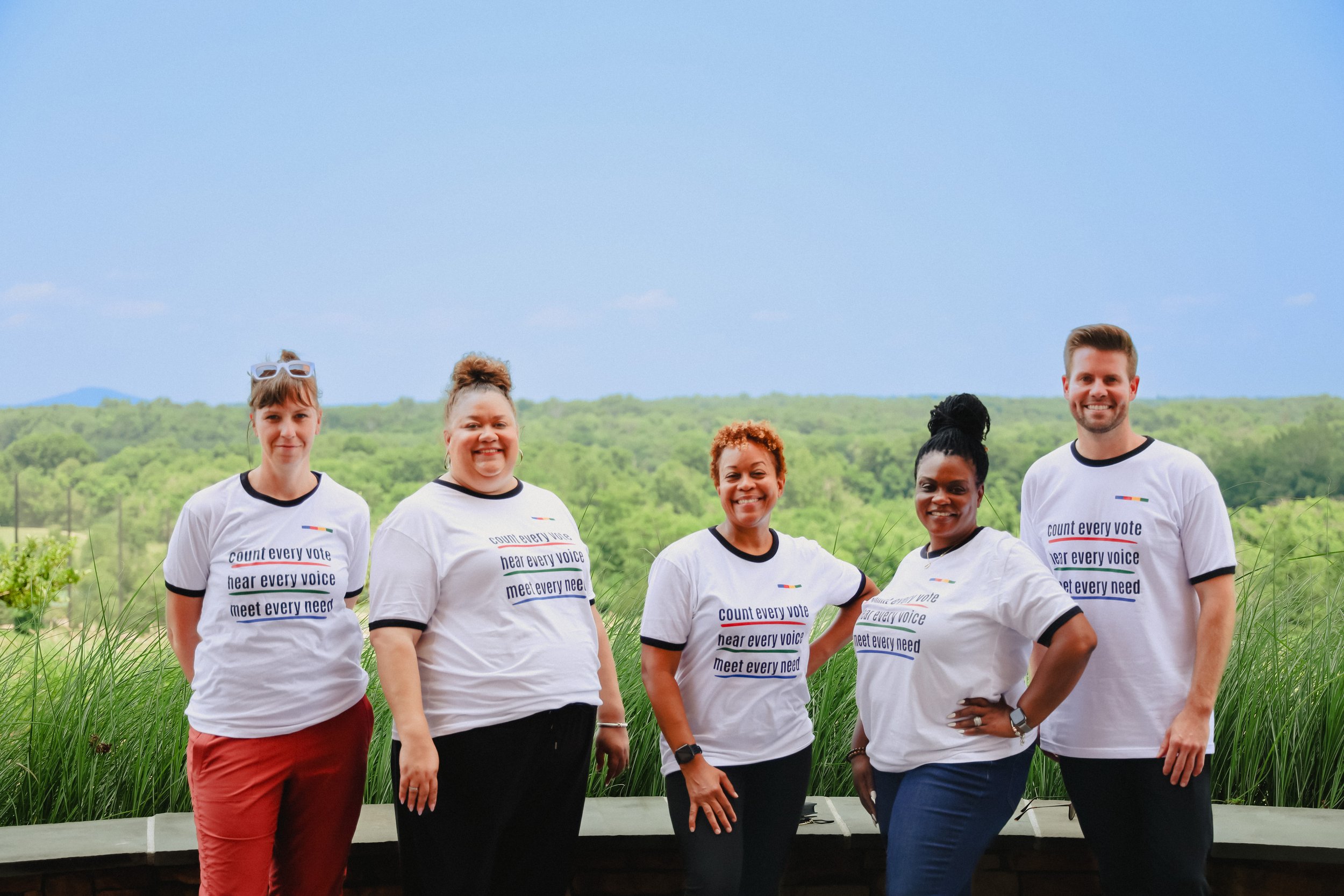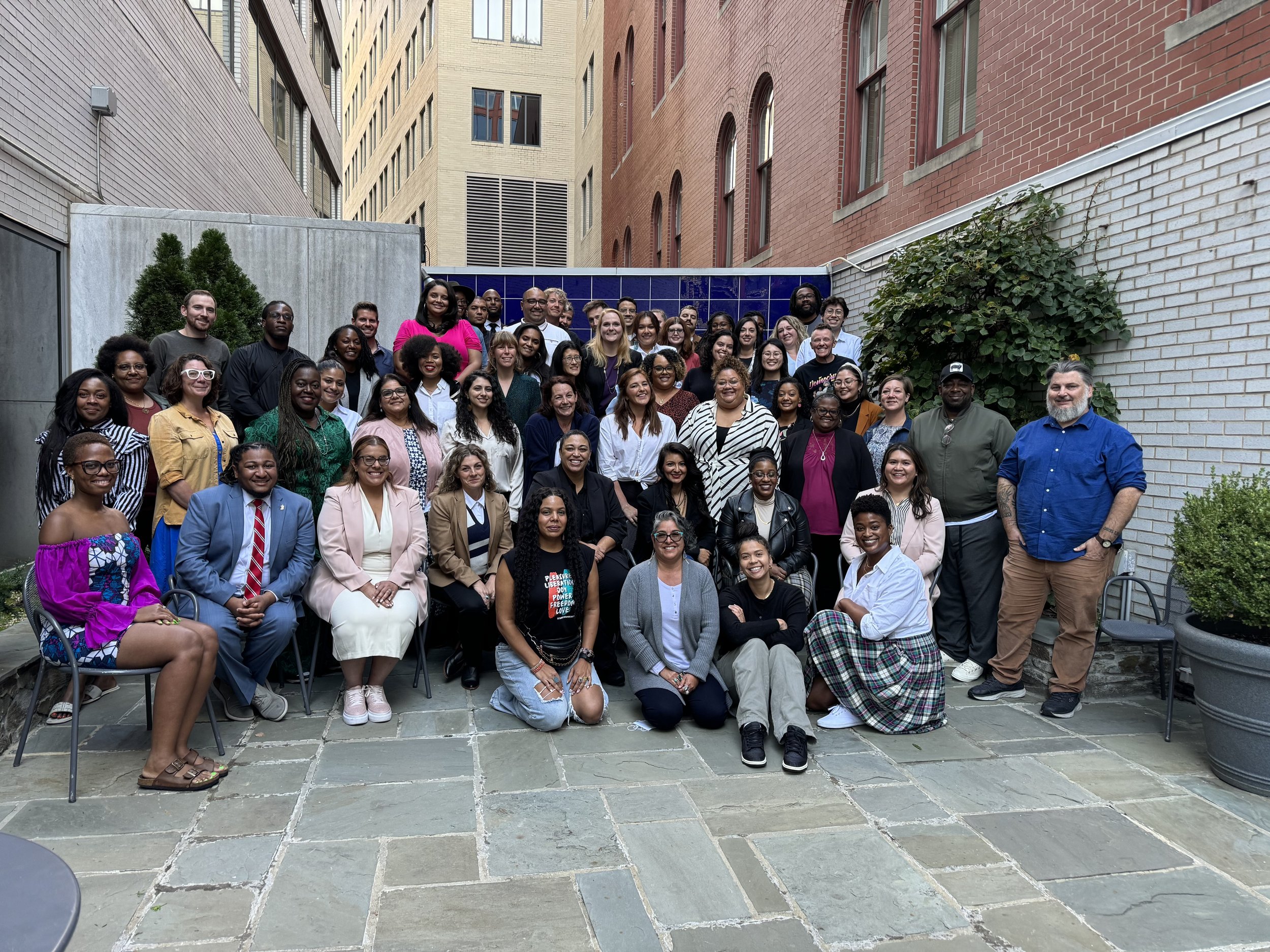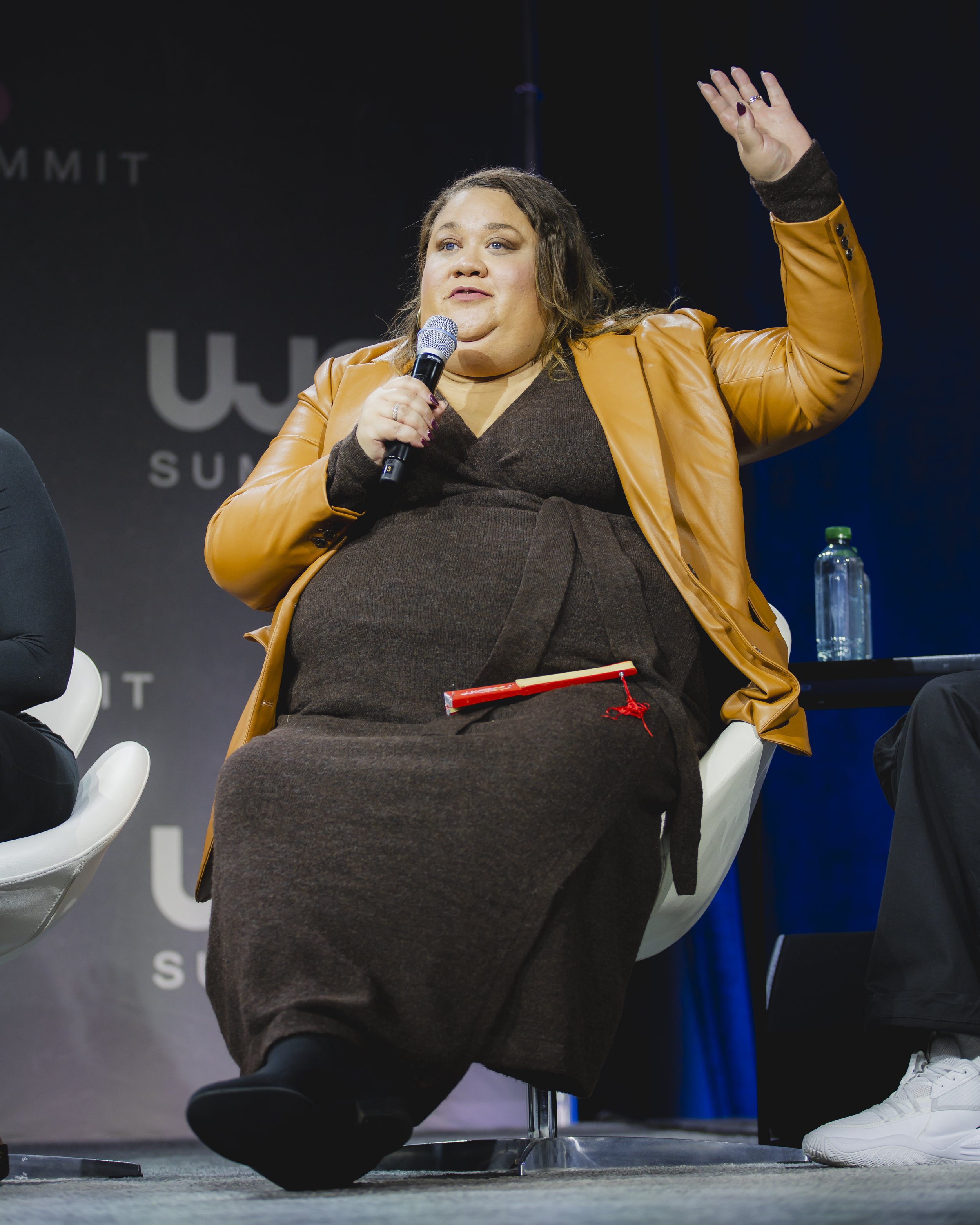Culture Eats Strategy for Breakfast: A Recipe for Building Strong Organizational Culture, Seasoned to Taste
By Alexis Anderson-Reed, Chief Executive Officer, State Voices
In a five year period, State Voices transformed from playing traditional toxic nonprofit politics to becoming a majority-women-of-color-led network with over 1,200 partners centering BIPOC political power in theory and in practice.
In 2018, after many years of grassroots organizing and coalition building, I had the opportunity to become the next executive director of State Voices. The largest nonpartisan civic engagement network in the country was calling out for transformation. Initially I struggled deciding whether to answer the call.
The U.S. was barely two years out from one of the most devastating elections of our generation. The 2016 elections demonstrated the futility of traditional GOTV and voter registration efforts and exposed foundational flaws in the country’s democracy. It exposed the urgent need for our democracy movement to reckon with years of contradictions, and decades of prioritizing traditional voices at the expense of marginalized ones. State Voices and other organizations were being called out, publicly and privately, for contributing to the toxicity.
Two years after the election, our network was reeling. Our people were losing faith in the meat and potatoes of our work. I was once executive director of a State Table in the State Voices network, and I was losing faith, too. Soon, because of our collective investment in transforming our culture, we’d find our hope.
With equal amounts of excitement and trepidation, of honor and doubt, I accepted the opportunity to lead the network. With this acceptance came a commitment to a critical lesson I was learning with other movement leaders I admire. The lesson: organizational culture eats strategy for breakfast.
An organization can have the greatest mission, and even do impactful work, but it doesn’t matter if internally the house is falling apart. If internal policies and practices fail to reflect collective values and the mission, or if the people in the organization don’t feel the values in practice, bad culture will take down strategy. It’s only a matter of time. Bad culture can take down whole networks.
Why? Because we need each other. We need each other to be centered, whole, and confident in ourselves and the collective in order to do the work.
If we want a world where we all live in our full dignity, we need to model that world within. And if we know our movement needs a creative transformation in order to do that modeling, we need historically excluded voices at the table.
With this in mind, I developed a personal, three-pronged north star when I started in my role leading State Voices:
Be in service to the states and organizers on the ground.
Center BIPOC political power and ground ourselves in a racial justice and Black Liberation framework.
Make State Voices one of the best places to work.
Making State Voices one of the best places to work was an ambitious goal then and it’s an ambitious goal now. I’ve been the State Voices CEO for five years as of fall 2023, and I’m still learning. I want to share those lessons with you.
Many people, inside and outside of the State Voices network, have remarked that something magical is happening here. I’ve heard people say we have some of the most attuned and reflective staff. We are collaborative yet autonomous. The trust is tangible, and staff deeply believe in the movement. And the work the State Voices’ team creates is brilliant.
How do we do it? One of my friends and co-workers once told me that you can teach leadership and organizational culture like following a recipe, but each leader will bring a different flavor. In this recipe, certain ingredients are required, but you have to season to your own taste.
These 10 bite-sized lessons are the seasonings I recommend:
Know your story of self, and remain accountable to those who got you here.
Remember the journey that brought the organization to the present.
There’s power in vulnerability and authenticity.
You don’t have all of the answers, and you never will.
Things move at the speed of trust, and you’re responsible for building it.
What everyone will remember most is how you show up for each other.
Know what conditions bring out the best in your team, and in yourself.
Leadership means making hard decisions.
Culture means constant learning and constant practice.
Own your superpower.
1. Know your story of self, and remain accountable to those who got you here.
We stand on the shoulders of our ancestors and trusted guardians. Their stories inform our own.
Your story of self describes the moments and experiences that have shaped your values and motivate you to pursue your path. This story gives you clarity. When you understand where you came from, you gain better direction for where you’re going.
I stand on the shoulders of my grandmothers. One, a Black woman born into sharecropping in 1933 in Memphis, TN, who taught me about the importance of voting, civil rights, and making your voice heard; the other, a white woman born into farming in the Midwest, who took care of her siblings and and was abandoned by her parents after falling in love with a Black man. My grandmothers led with love and determination, and acted courageously.
I also stand on the shoulders of all of the freedom fighters past and present who dedicate their lives to building a better future for generations to come. Black people who fought to be free from chains, poor and working class people who worked hard every day to put food on the table, and women who have held their families and communities together through love. Freedom fighters throughout history show that we all have a role to play to achieve a liberated world, bit by bit. We’re a small piece of a very large pie.
Because of these histories, I have faith that I can live out my purpose as long as I practice determination, love, courage, and a commitment to doing my part to make the world better. These principles are foundational to my leadership. And without them, it would have been difficult for me to help rightsize the State Voices network.
When we gather as a team and network, we carve out intentional space to share who and what has brought us to this work. One way we do this is through a centering, a practice I learned from Black Organizing for Leadership & Dignity (BOLD), where we name who we are accountable to as an organization and as individuals. This allows us to carve deeper connections with each other and with our commitment to our mission and communities.
As an organization, we are accountable to our network — our State Tables, Emerging States, partners, and organizers doing this work on the ground every day. State Voices is also accountable to the people we are working to build power with and for — BIPOC folks, young people, women, LGBTQ community, Disabled people, and more. Individually, many of us are accountable to loved ones, community members, or our faiths.
Practices that ground us in our history force us to reflect on how we make equitable decisions, what work we prioritize, how we hold ourselves and one another accountable, and how we build trust. These practices have been core to State Voices’ transformational journey.
2. Remember the journey that brought the organization here.
The State Voices network was in a rough patch in 2018. The U.S. was in turmoil under an increasingly hostile political regime. The state-based coalitions (State Tables) that make up our nationwide network had little trust in State Voices, and for understandable reasons. Women of color in the network called out much of State Voices’ leadership for lack of equity and a toxic work environment. The organization was in deficit and had a skeleton staff. State Voices had left a bad taste in people’s mouths. We didn’t just need a new recipe, we needed a new kitchen.
I came to direct the organization at a challenging time. “I wasn’t here for that and it’s not my problem” would have been an easy position to take. But that approach would have hindered us. In order for the organization to thrive, State Voices had to repair harm. I had to be honest about our shortcomings. We had to strengthen our relationships and our understanding of each other, as individuals and as organizations.
Soon after I entered my role, State Voices started a Strategic Direction process where we conducted interviews, workshops, surveys, and more, with State Tables, partners, funders, and staff. We rigorously researched the root of our network’s issues and creatively imagined solutions. This was a long process — we didn’t finalize our direction until 2020 — but it was a beautiful process because our network had the opportunity to dream. We had the opportunity to build something that was bigger than ourselves, in furtherance of a collective vision for a multiracial democracy and a culture we could all be proud of.
During this Strategic Direction process, we set a North Star for our network. Our North Star named our organization’s desired destination of freedom and liberation. This practice, along with my personal North Star, is rooted in Black radical traditions. Enslaved people used the North Star in the sky to orient themselves directionally as they escaped bondage. That in turn inspired Black activist Frederick Douglass to start The North Star, an abolitionist newspaper, in 1847. State Voices' North Star is informed by movements of our past, both in theory and in practice, because we know there is no future without it.
At State Voices, we continue to share our story of transformation: how we have created our new strategy and culture and why we make the decisions we do. It's an important history for all people in the organization and network to understand. We incorporate this into our onboarding processes, and into our convening and retreat spaces. At our June 2023 National Network Convening, our National Coordinating Committee led a session on our network history, what we have learned and accomplished, and where we are going. It is important to not live in the past, but it is important that everyone in the organization has a grounding in our shared history.
Today, comparing where the network was to where we are going now makes us even prouder. Our honesty about this journey, and our vulnerability in identifying areas to grow, is our power.
3. There’s power in vulnerability and authenticity.
When you show up vulnerably and authentically as a leader, you show others they can do the same. Vulnerability and authenticity doesn’t mean bending to every emotional impulse — instead, it means knowing who you are and being who you are confidently and humbly. It means recognizing the humanity in yourself and others.
One of my first jobs was at Einstein Bagels, where I was an assistant manager. Each night the bathroom had to be cleaned. I could have easily assigned that role to one of the people I supervised. Instead, I rotated with them because I wanted to share the work equitably, I wanted to know how to do every role in the restaurant, and I never wanted any task to be beneath me. This is a leadership lesson I have carried throughout my career.
It’s important to remember the critical significance of every job. As a leader at State Voices, I still do text banks. I join our staff to fill name tags and stuff folders for our conferences. There’s no job beneath any other. We’re all people, and no one’s better than anyone.
Because we’re all people, we also all have good and bad days. We have things that trigger us, things that make us laugh that no one else may understand, and things that make us cry. It’s natural to be worried about being vulnerable and showing emotions as a leader. This is especially true for leaders from marginalized identities who face more scrutiny than others.
When I first started as executive director at State Voices, I worried whether showing emotion would diminish my leadership. I was very in control of my emotions for the first few months and prided myself in my poker face. People would say that I was remarkably calm in the midst of chaos.
My emotional detachment may have been rooted in self-protection and preservation, as I had to make a lot of tough decisions. But I wasn’t showing passion. I was stifling my true self.
Less than a year into my new role, there was a tense discussion during a leadership team meeting about the finances of the organization. I inherited a $4M deficit. One of my priorities in my first year was to clean up our financial operations and raise money to put the organization in a positive fiscal position. During this meeting I started to cry. The emotions that I had been stuffing down, and the stress I had been carrying but not expressing, bubbled to the surface.
People were shocked. I was shocked too, especially by their response. Someone on the call said, “It’s good to know you’re a real person.” My relationships with those folks deepened from that day because they were able to see me. I now lead with vulnerability and see it as a strength, not a weakness.
It is no coincidence that, in 2023, people throughout the movement ecosystem continue to remark how emotionally attuned State Voices’ staff is. That attunement allows us to connect around our shared humanity. That connection creates a safe space for staff to take intellectual risks that lead to innovation.
4. You don’t have all of the answers, and you never will.
One way to stifle innovation quickly in an organization is to position oneself as an all-knowing leader who can never do wrong. There’s no such thing. We have teams because each of us has experience, expertise, and perspectives to learn from. Being honest with your own fallibilities as a leader provides space for other people to step into their own leadership. In our society, leadership usually looks one way — white, male, all-powerful, and focused on productivity over people. It is only through breaking that narrative that we can bring new leaders to the table.
One of my favorite things to say is, “I don’t have all the answers.” We all have our growth edges. There are some things I will never know. Challenging the idea of perfection helps us appreciate different perspectives that we wouldn’t have considered otherwise. Somewhat paradoxically, admitting to gaps in your knowledge and expertise increases people’s trust in you.
5. Things move at the speed of trust, and you’re responsible for building it.
When you inherit leadership at an organization that is going through a rough patch, you may end up surprised at the kinds of changes people are resistant to. When I started at State Voices, I unexpectedly got a lot of pushback on a decision I thought was relatively small: switching our internal communications platform from one chat service to another.
I took a risk after about an hour of heated debate. I said, “Can we try out the new service for 30 days, and if it doesn’t work we can switch back? Can you trust me on this?”
Five years later, not only do we continue to use the new service, but we’re able to have much higher stakes debates about more critical decisions.
Back then, people didn’t trust me yet to make decisions. And by leading with love and courage, I could understand why they felt that way. So many people have had past traumatic experiences with bosses, whether at State Voices or otherwise. In 2018, the memory of State Voices’ formerly toxic environment was still acute. I had to explicitly name that trust was important to me. I had to show over time, through both words and actions, that I was committed to building it.
The long, collaborative, and thorough process we did through our Strategic Direction rang in a welcome tonal shift in the trust of our network. We listened to people's perspectives and workshopped our strategy together through a transparent, multistage journey. Our network collectively created a strategy that has steered us through the last five years. All of State Voices' organizational, departmental, and individual annual goals from 2019 through 2024 have been rooted in the outcomes of this direction, and it's helped us strengthen our trust, culture, and strategic aptitude every year.
Building trust and treating that trust with continued care is a critical leadership skill. I learned something surprising when I became a 2019 Rockwood Leadership Fellow to continue sharpening these skills. People appreciated the collaborative way I approached decisions, but sometimes staff wanted me to just make a decision! It was a testament to the trust that had developed over the last year — people trusted me to do what was best.
“Can you trust me on this?” has now become a regular phrase in my lexicon. Sometimes a decision needs discussion and input, and other times someone just needs to make the decision. Trust is the foundation that helps us navigate between the two.
As a leader, you also have to trust your team to do what’s best. At State Voices, it’s important that people have autonomy to create and make decisions in their role of expertise with the support of their team. And when there are major shifts within the organization, we get input and are very intentional about how and why decisions are made.
We bring people into the decision-making process along the way, and create room for processing hard decisions. Trust, and nourishing that trust by seeing each other’s humanity, can lead you through crises.
6. What people will remember most is how you show up for each other.
The entire country, and the world, were back in crisis two years after I started my leadership role at State Voices. 2020 brought with it the political fight of our lifetime. The COVID-19 pandemic compelled nationwide conversations around access to health care, livable wages, and safe working conditions. The presidential election inspired people to join the ongoing fight against fascism. Police violence motivated Black people and our allies to take to the streets to disrupt business as usual.
I knew State Voices couldn’t continue our business as usual, either. As we were adjusting our plans at State Voices because of these crises, I knew early on that the most important thing to do was to take care of one another. Our capacity to care for each other was what would matter in the end — not the amount of voter contacts we made.
When the pandemic spiked all over the world in the spring and summer of 2020, State Voices made some key commitments. A few of them are listed below:
We moved to be 100% remote, provided at-home work stipends, and continue to be flexible with our remote work offerings.
We kept on all canvassers to make sure they had healthcare and provided them with technology so they could stay connected.
We created a flexible schedule for everyone, so caretakers didn’t have to use PTO.
We implemented a four-day work week and a mid-year break.
We offered and openly discussed mental health support.
We did trainings on safety and sent hundreds of thousands of dollars in PPE supplies to communities.
We held safe spaces and conversations for Black folks and other race-based caucuses, including a white accountability caucus, where people could express their feelings and learn from outside experts and one another.
We launched a wellness program where we provided weekly space for meditation, yoga, tips on ergonomics for working from home, eating healthy, and aerobics.
I started to share what we were doing with other organizations as the year went by, and discovered that people were appreciative to learn from us. State Voices started becoming a leader in our ecosystem around creating a strong culture that truly supports people.
I knew that our approach to 2020’s crises would be the litmus test for how we approach all of our work. I’m most proud of how we treated each other, but I am amazed at our other accomplishments. That year, State Voices was still able to make over 225M contacts to voters and launch new digital tech tools, with thousands trained. We regranted over $9.4 million to State Tables. We were a new organization operating at a new level. We wouldn’t have been able to do this if we didn’t proactively improve our conditions, and put people first.
7. Know what conditions bring out the best in your team, and in yourself.
State Voices grew a lot in 2020. This growth was sustained through 2021 and 2022 — our budget in 2021 was $20M, and in 2022 it was close to $30M. We were able to do this because we cultivated the conditions for our team to show up the best we could.
Knowing what these conditions are for your organization, and for yourself, is key to strong leadership and culture. I ask the following questions to myself periodically: “What are the times you’ve been your most courageous, sharpest self? What practices do you have to make this possible?” Every person will have a slightly different answer.
For me, I operate at my highest level of leadership when I feel rested and centered in mind and body. When those conditions are present, I am decisive, sharp, and able to listen to my gut. I can create those conditions for myself by getting enough sleep, eating well, taking breaks, meditating, bonding with friends and family, and embracing curiosity.
Leaders must understand how to create strong conditions for ourselves and for our teams in order to ensure we’re all moving from a grounded, confident place. There is some work I won’t do until I feel grounded — including making hard decisions.
I also operate at my highest when I am connected to those around me. Whether that be in thought partnership, deep relationship, or practicing joy, being aligned and in authentic connection to a team motivates me. This is also a condition that motivates many others on our team. Creating moments for us to work, learn, and have fun together are critical.
One of my favorite practices that has now become part of State Voices’ tradition is our annual lip sync battle. It’s silly, child-like, friendly competition, and that is the whole point. Joy and play are conditions that bring out the best in my whole team. Creating space for joy, practicing joy, and reflecting joy in my leadership has been a gamechanger and foundational to the culture we are building together.
8. Leadership means making hard decisions.
Effective leaders are decisive. You must be able to rise to the occasion and make hard decisions in tough situations. Sometimes your preferred solution isn’t available and you have to make a suboptimal choice. And sometimes you make the wrong one! Leading effectively means learning from every decision you make, especially the hard ones.
One of the hardest decisions I have to make in my role is the decision to let someone go. I still struggle with it. People drawn to social justice spaces are usually very caring. It’s hard to hurt people by letting them go from a job. But there is rigor to this work of building a multiracial democracy and supporting 25 State Tables to do so. Sometimes, State Voices might not be the right place for someone. No organization can be the right place for everybody. A separation can be what’s best for the person and what’s best for the organization.
Letting someone go is never easy. It’s one of my least favorite parts of my occupation. But you can do it with respect and support by providing severance in pay and health care, and helping people with a landing plan. We’re all humans and shouldn’t be thrown away; and the work we do and the culture we’re cultivating is too important to ignore obvious incompatibilities.
One or two people can disrupt an organization’s culture. I’ve seen it. There have been times when I didn’t let someone go when I should have, and it caused problems later on. Having the right team is critical to culture and strategy. Leadership is responsible for building that team.
Personnel changes are one of the many hard decisions leaders face in our space. There are many more. I get through having to make hard decisions by taking care of myself and confiding in trusted colleagues. The nourishment I receive from these trusted people and my friends provides the strength and clarity I need to be the leader the State Voices team deserves.
9. Culture means constant learning and constant practice.
Building team culture is ongoing — it’s all day, every day, and never-ending. Culture work is necessarily repetitive and foundational. It’s the lifeforce for our work and sets the tone for how we engage as a State Voices team, and how we engage with others. I learned this lesson clearly in 2022 during a State Voices staff retreat.
It was our first in-person staff retreat after being completely virtual since March 2020. Many people were meeting for the first time after only knowing each other through a screen. Our staff size was much larger than it had been in 2020 — between 2020 and 2022, we onboarded nearly 30 new staff. At this point, I had been an Executive Director longer in the pandemic/virtually than I had been in-person, which was also true for the majority of people on my team.
With the growth of our staff and the virtual component of the work, I started to feel less connected, both in the day-to-day work, and the culture. I was excited to build community during our 2022 staff retreat because I felt our connectivity and our community slipping away. I was nervous because I wanted to be sure we had all of the protocols in place so no one got COVID-19 — this was what I was most worried about. I was not prepared for what was to come.
During this retreat, we had a facilitated conversation about defining our values and identifying our growth areas. We did a four-corners exercise where each corner of a room represented an answer — “Yes, No, Somewhat, I’m Not Sure.” We would ask a question — like “Does State Voices value its employees?” — and people would answer the question by moving to the corner of the room that corresponded to their response. There were more negative thoughts expressed during this exercise than I expected.
I felt shocked and overwhelmed. I knew there was work State Voices still had to do, because culture work is ongoing, but I was not prepared for the perspective that we needed to be doing so much more! I wondered whether people recognized all that we had rebuilt over the last couple of years. I felt so personally hurt. I wanted to give up. It felt like I had nothing left to give.
After taking time to reflect and let the experience sink in, I made a few discoveries. Firstly, many staff at State Voices weren’t present during our major shift from 2018-2020. Secondly, attitudes toward work and people’s expectations of the workplace had shifted since the pandemic. I also learned that many people being hired had not received the training and ideological development that others of an older generation had received, because leadership development programs had been decimated. These resources are essential for new folks coming into the space, especially in a remote work environment.
Ultimately, I am so grateful to the people who spoke up during this exercise during the 2022 staff retreat for bringing these unmet needs to my attention. In response, State Voices has recently implemented the following:
Created a new Equity & Culture Working Group that conduct assessments on fair processes and policies across the network
Hosted more retreats, including a leadership retreat to train departmental leaders and managers on culture
Encouraged people to let go of projects and say no to more work (including myself!)
Established a hybrid working environment, with many staff permanently remote
And we are working on the following items:
Hiring someone to solely focus on organizational culture — HR and culture are not the same!
Launching a staff-wide political education curriculum
Launching a facilitation training series
These are just a few priorities that State Voices leadership is moving forward to proactively build our culture every day. This prioritization of culture is what makes State Voices unique. It is our superpower.
10. Own your superpower.
Every leader has their own sauce that makes them unique. Women of color are often told by mainstream society that the things that make us unique are deficits. It’s not true, and we must remind ourselves of this every day. The things that make us different could be our greatest assets.
I described earlier how I used to shy away from my vulnerability and emotional attunement, and how I learned that those traits are strengths. Attunement isn’t just my strength, it is my superpower.
Early on in my career as Executive Director of State Voices, I was facilitating a group discussion around a critical, tough decision. I could feel the discussion growing tense, though it wasn’t clear why. Through attuning myself to the room, I perceived that the tension was from uncertainty and fear about the drastic changes our organization was making. Fear around whether State Voices had the ability to change. And if we could change, whether that change would help or hurt us.
I drew a simple picture on the whiteboard for the group to see — a tunnel. I described the feeling of being in a tunnel and not seeing the light, and not knowing how long it would take to get to the other side. Our network would be in this tunnel for some time, but together we had the ability to get to the other side. But we couldn’t do it by going backward. If we moved forward together, giving grace to each other’s stress or anxiety as we navigated the darkness, we would one day reach the light.
There are a lot of factors that can make people fearful of moving through that proverbial dark tunnel. I asked everyone in the room to write down the fears that were holding them back. Everyone wrote down a feeling on a note, then ripped up the paper and threw it in the trash. The energy shifted, and we collectively used that tunnel framework through the rest of the year. By our first convening in 2019, when our network of State Tables and State Voice staff came together in North Carolina in person for the first time, State Voices was finding the light. We’d made excellent progress on our Strategic Direction. We had hard discussions and still broke bread together. We balanced planning, strategy, and joy. Our network emerged into the sun.
You have your own superpower. Write it down, but don’t rip it up or throw it away. Put it somewhere you will revisit everyday. At your desk, on your bathroom mirror, or on your refrigerator. This superpower is the zest of your leadership approach. Share it with others and remind yourself of it always.
Every leader will do things a bit differently. Every organization will have a slightly different culture. I’ve been refining my leadership seasoning blend at State Voices since 2018, and will continue refining it as long as the network will have me.
The 10 bite-sized lessons here are what I have learned so far during my journey. What have you learned while on yours?
Alexis Anderson-Reed is the Chief Executive Officer of State Voices.
Alexis has been an activist since she was a college student. Driven by the disparities in educational opportunity she encountered growing up in Wisconsin, she co-founded Youth Reclaiming Our Communities (Youth ROC), mobilizing students across the state to press for education finance reform. Since then, she hasn’t stopped working toward a vision of a more inclusive and more equitable society. She has dedicated her career to community organizing, coalition building, public policy, and strategic planning, exemplified by her work on issues of racial and gender equity and the politics of power and privilege.
Prior to her tenure as State Voices’ Chief Executive Officer, Alexis served as the deputy director of the Funders’ Committee for Civic Participation, a philanthropic affinity group dedicated to enhancing democratic participation in all aspects of civic life. Before joining FCCP in 2016, Alexis served as the senior director of programs for State Voices, leading efforts to support and expand the work of our national network of state tables in promoting civic engagement, civic access, and civic representation. She came to the national office of State Voices after serving for three and a half years as executive director of Wisconsin Voices, where she worked to expand and defend voting rights in the state.
Alexis graduated with honors from Alverno College with a degree in History and Political Science, and completed coursework for a Master of Arts from the University of Wisconsin–Madison. Alexis serves on the boards of the Alliance for Youth Organizing, State Innovation Exchange, and the Analyst Institute. When not at work, she can be found trying out new recipes for family and friends and traveling with her husband, Derek.
Return to the main page to see more highlights from “Navigating Change: Toward Equitable, Democratic Organizations,” a series on bridging generations, expanding leadership, and envisioning the future of work by ten Content Fellows.

